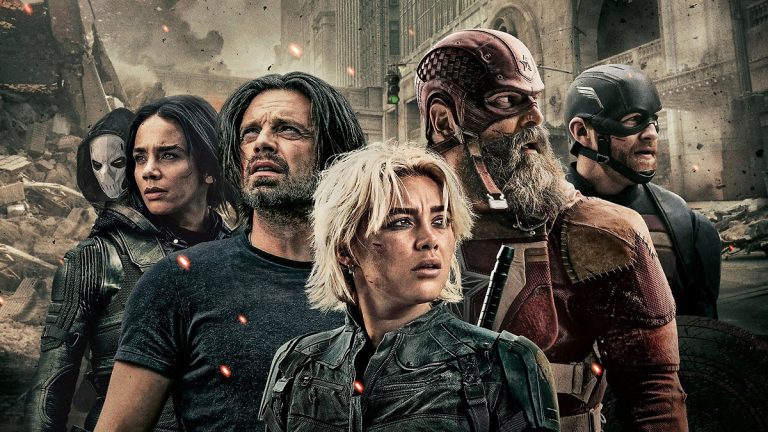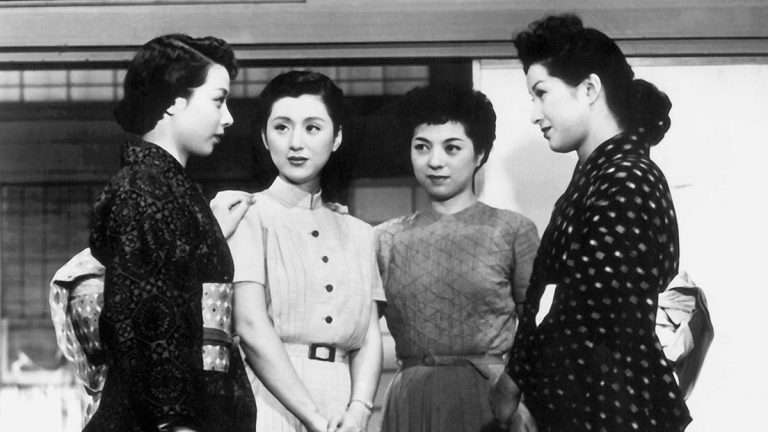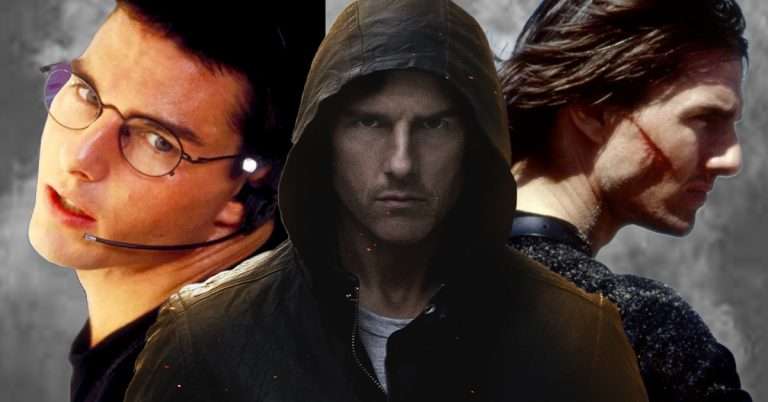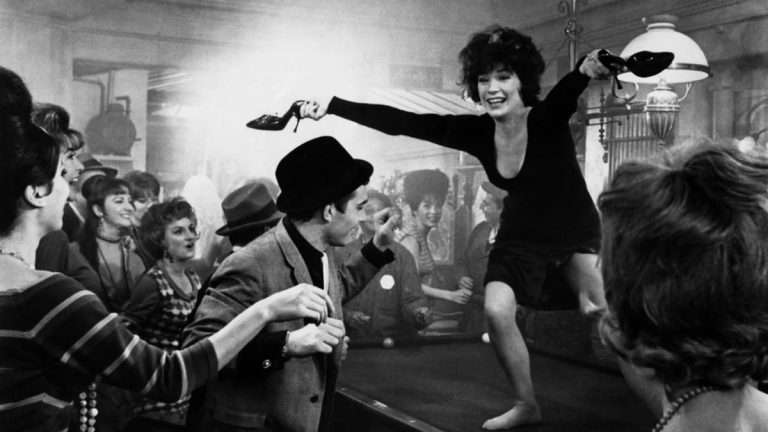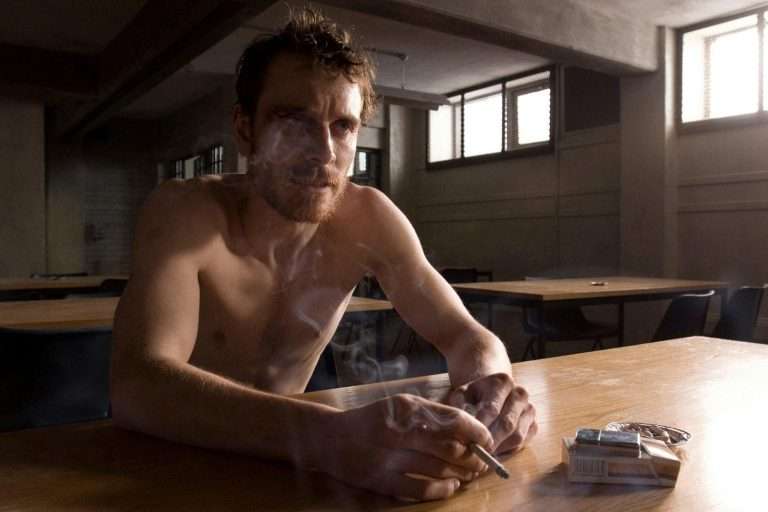I remember being taught in school that ‘queer’ meant strange. It took years of growing up, reading literary theory, and practicing to speak the word aloud (after a few humiliating failed attempts) that I can now pronounce it with perfection. In the 21st century, queer is an umbrella term that has come to refer to everything and everyone beyond the hetero-norm. Most social activists prefer using the word ‘queer’ instead of the phrase LGBTQIA+ as an effort to reclaim (or reappropriate) the term as a politically radical and deliberate alternative to mark their social presence. The word has come to assimilate any non-normative behavior, sexual identity, and intersectional politics that seek to do away with the binaries existing in our society.
Although in 2018, a part of Section 377 of the Indian Penal Code that criminalized sexual intercourse between persons of the same sex was declared unconstitutional, the queer community is still fighting for its rights as they continue to bear the brunt of social prejudice. In this scenario, the success of a Bollywood film, Badhaai Do (2022), that positively facilitates the visualization of the queer community is a congratulatory first step towards popularizing stories of the queer community in contemporary Indian popular culture. However, the oft-neglected genre of short films has already surpassed the feature film category in queer visualization, winning laurels across several national and international film festivals.
Following is a list of 15 Indian short films that beautifully bring out the essence of queer love, focusing on the hurdles faced by the community in a changing Indian landscape. Familiarising yourself with them will be an effective exercise, I promise, in unlearning the hetero-patriarchal ideas that you may have been conditioned into about the queer community. It is important to mention here that this list has been curated from a personal point of view. There are many other beautiful short films on the queer community that you can watch for free on the web. If you think you have better and more recommendations to grace my watchlist, please feel free to comment below. Happy Pride to you!
1. Bomgay (1996)
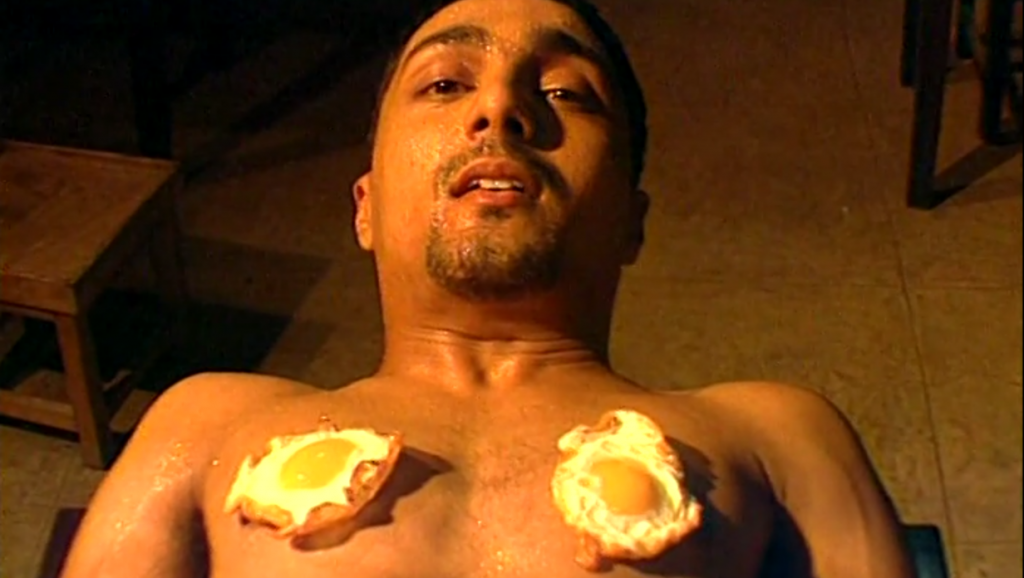
Directed by Riyad Vinci Wadia and most popularly acclaimed for being India’s first gay film, this 12-minute short film is further divided into a collection of six shorts/segments based on the poetry of R. Raj Rao. In fact, the film was never commercially released in India because Wadia did not submit it to the Censor Board, believing it would never grant its approval.
The film begins with a brief description of Section 377 under the Indian Penal Code, which was popularly used to persecute the queer community. Narrated by Rajit Kapur, these sections poetically come together to take us through the closeted and liberalized lives of the gay community of India in the mid-1990s. The use of colors, insightful imagery, paintings, and gaze fantastically mishmash into this short to generate a realization among us of the marginal but throbbing existence of the queer subculture in Mumbai, one of India’s largest metropolitan cities. It is one of the finest shorts out there that could be a good first step in exploring this genre.
2. Geeli Pucchi (2021)
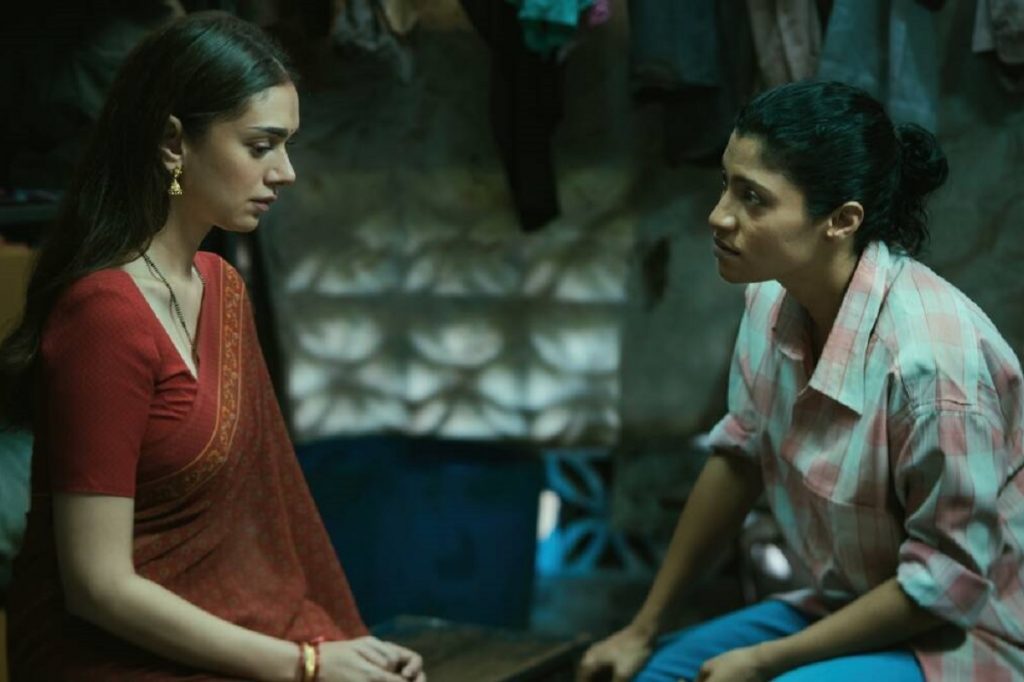
If the Netflix anthology, Ajeeb Daastans (2021), stands remembered till this date, it is because of the nuanced depiction of the intersectionality of caste, class, and sexuality that director Neeraj Ghaywan brought to the screen in his short, Geeli Pucchi, or Sloopy Kisses. Bharati (played by Konkona Sen Sharma) is a Dalit-queer person and a factory worker, while Priya Sharma (played by Aditi Rao Hydari) is a new employee recruited to work at the position that Bharati desires for herself. We learn that Priya is an underqualified Brahmin girl, and Bharati might be truly eligible for the role; there’s a hint that the latter gets the job because of her dominant caste identity. Both Priya and Bharati are queer women; while the former struggles to make peace with her newly married life, Bharati is comfortable identifying herself as queer. A brief intimate interaction between them is preceded by a confirmation of their caste identities, during which Bharati lies about being a certain ‘Banerjee’. However, the truth comes out and leaves Bharati heartbroken and humiliated. This messy, fractured world is further complicated as the short steers towards the finish line.
Related to Queer Movies: Geeli Pucchi: The Missing Colors in Our Rainbow
The film probes us to re-configure our notions of love and identity in an intersectional space. Caste, considering it is the Indian landscape, reigns above all. Bharati’s caste identity comes close to Sharmila Rege’s formulation of the location, rather than mere identification, of the Dalit feminist standpoint. Most importantly, it seeks to humanize how labor functions in the everyday world without reducing these broad, intersectional ideas into fundamentally black and white conflicts. Its popular release helped broach a discussion around intersectionality (in general) and, in my opinion, is one of the best short films to have come out of India in the recent past.
3. Saving Chintu (2022)
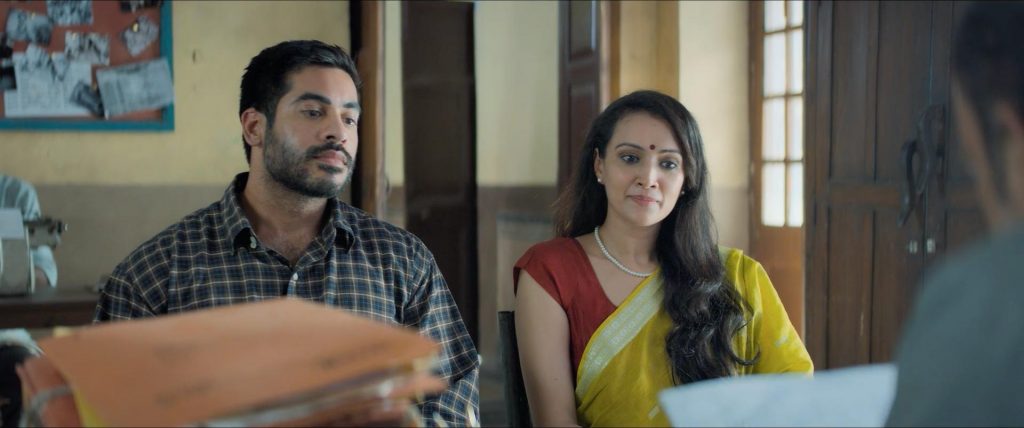
Directed by Tushar Tyagi, this short unfolds at the junction of sexuality, politics of child adoption, and taboo around AIDS. It follows the story of an Indian-American queer couple, Sam (played by Sachin Bhatt) and Oliver (played by Edward Sonneblick), who has come to India to adopt an HIV+ boy, Chintu (played by Arihant Angad Nayak). Running parallel is the story of a heterosexual Indian couple – a certain doctor and his wife (played by Adil Hussain and Priyanka Setia) – who also wish to adopt this boy, directly bringing the queer couple’s interest in a contest with the heterosexual couple. It brings out the emotional turbulence faced by the queer couple, as they need to come up with a plan to fake a heterosexual marriage to convince the orphanage manager.
It is a powerful story with a charged narrative that lays bare the sinister politics at the heart of the child adoption system in India and the continuing sufferance of the queer community at the hands of social prejudice. Besides, the orphanage manager’s attitude towards Chintu and his HIV+ condition also shows how we continue to perceive AIDS as a taboo. The process is, ultimately, draining and bound to leave anyone with a mental and emotional toll. What surpasses these differences is monetary gains, and the film could not hold up the flaws in the system any more transparently. Tyagi’s short has been selected for over 15 International film festivals and qualified for contesting in the Live Action Short category at Oscar 2021.
4. Sisak (2017)
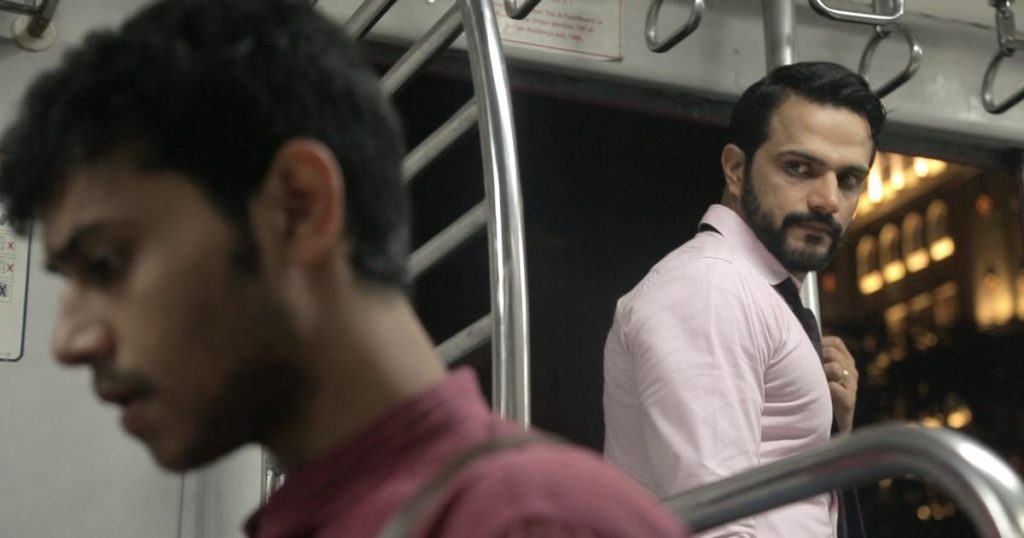
Directed and written by Faraz Arif Ansari, this is branded as India’s first silent queer romance that doubles up as a commentary on the gay community in India. Here, two men come across each other as they travel in the same compartment of a local train. Both these men are queer and closeted; they are marked with heterosexual motifs until you look closely. Kudos to the fantastic cinematography here. Played by Jitin Gulati and Dhruv Singhal, the two characters feel attracted to each other and share a few glances. They don’t share a word or a touch, yet the longing marks itself through the way their hands graze a pole, which is, of course, a hint at the phallus. Only train sounds fill our ears as the short speeds from the beginning to the end.
The books the protagonists carry contribute to the nuanced layering of the story. The train journey becomes synonymous with the emotional journey the two men trace, singularly and with each other. What’s noteworthy is the one-hand distance that never gets bridged between them, perhaps drawing our attention to the unfailing reality of the closeted lives of gay men in India. It is also interesting to note how two aspects of masculinity – the suited-booted gentleman and the braceleted, kolhapuri-wearing man – come together in this short. It won the Audience Choice Best Film Award at the Wicked Queer Film Festival, Boston, the first Indian film to win it in the last 33 years.
5. The Booth (2018)

Directed by Rohin Raveendran, this short delves into a day in the life of a female security guard, Rekha (played by Amruta Subhash), at a frisking booth in a shopping mall. It is a mundane setting for a story made extraordinary by the commentary around how the frisking booth becomes a queer space for romance between Rekha and Sargam (played by Parna Pethe). Rekha and Sargam barely get to spend their day together, but the small gesture of sharing tiffin becomes central to their relationship and the short. The four walls of the booth seem to close in on the couple, simultaneously liberating them from the gaze of the outside world. To me, Raveendran’s short excels in posing the question of whether or not this safe space is really outside the dangers and taboos around queer visibility.
Related to Queer Movies: 20 Important LGBTQ Movies of the 20th Century
The camera follows Sargam at close quarters. There is a commentary on the hounding heteronormative gaze surrounding her and how she gazes back at the people in the mall. Interestingly, the Bollywood songs that Rekha and Sargam produce point toward the difference in their generations. Both these songs feature stories of heterosexual romance and drive home the idea that the language of romance in popular culture is largely limited to heterosexual affairs; perhaps, why the little that we see of their relationship in this 15-minutes-long short film blooms in the silence of the booth.
6. If You Dare Desire… (2017)
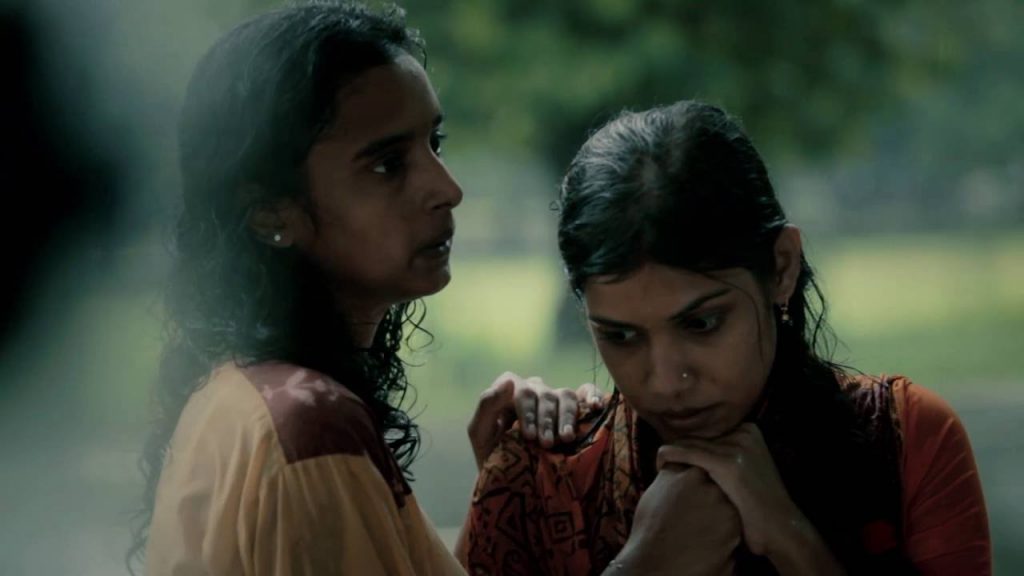
Directed by Debalina Majumder, all of whose works are a poignant exploration of queer identities and the many politics that govern them in heteropatriarchal society, this feature-length short broaches a very important question – “what if?” – and immediately etches out an imaginative trajectory for the prospering of queer love. The 2011 incident that this film, Abar Jodi Ichcha Kore… (or, If You Dare Desire…), seeks to recreate following the ‘if only’ scenario is of two women from Nandigram, a village in West Bengal, Swapna (played by Farha Khatun) and Sucheta (played by Manisha Bilkish). They were in love but afraid that society would not accept their relationship, they committed suicide. In Mukherjee’s short, Swapna and Sucheta run away to Kolkata in search of a new life where they can love each other more freely, even if that means fleeting from one identity to another and barely sustaining themselves. It is not a rosy life devoid of hindrances; at least they have each other.
The music that trots alongside the narrative is poetic, with beautifully written lyrics harping upon the constant state of uncertainty governing their identity and existence. A constant suspicion that the queer couple draws towards themselves, living almost in fear of getting caught, should help us scrape the surface of politics around the visibility of queer folx in society. Majumder further explores Swapna and Sucheta’s story in another work, And the Unclaimed, or Ebong Bewarish, (2013), where the story follows the aftermath of their suicide.
7. U for Usha (2019)
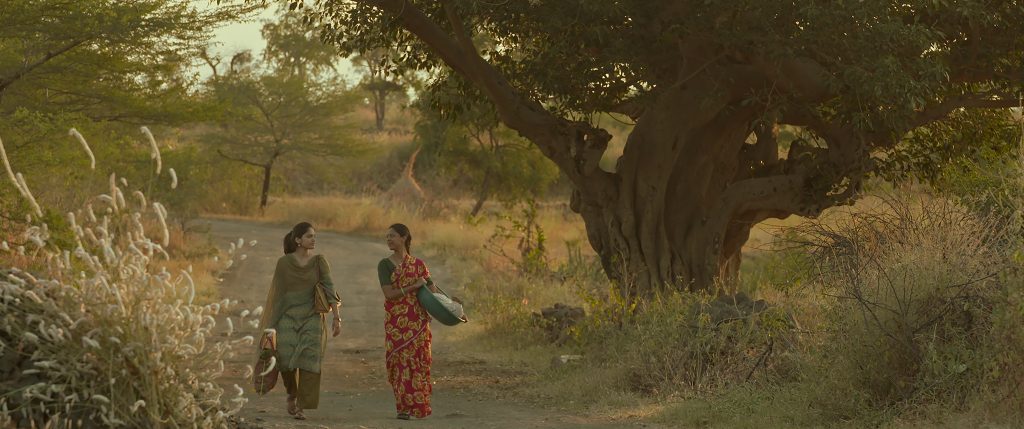
Directed by Rohan Kanawade, this short follows the story of a woman who finds herself attracted to her son’s school teacher. Now, it wouldn’t be half as interesting if the story was not set in rural India. Usha (played by Kiran Khoje) is a single mother responsible for earning a livelihood and her children’s upbringing. She seeks the help of the new English teacher, Manisha (played by Arpita Ghogardare), for improving her son’s grades at school and eventually learns some reading and writing.
It is interesting how Kanawade captures Usha’s gaze lingering along Manisha’s body to represent the curious attraction she experiences towards her. Further, a female camaraderie develops between Manisha and Usha that positively fills the short with delight. The film is full of silence and indulges it in helping the characters shine. The background score complements it. Khoje lights up the short with her expressions changing as she progresses toward feeling more independent, the final scene almost reminding one of the final scenes from The Portrait of a Lady on Fire (2019). There is a beam of satisfaction and anticipation on her face, making it an endearing watch. It aptly recalls the simple, throbbing joy of discovering your feelings for another. It garnered accolades across international film festivals, even winning the Satyajit Ray Short Film Award in 2019.
8. Sunday (2020)
Directed by Arun Fulara, this is a fantastic attempt at queering the relationship between a regular neighborhood uncle and his young hairdresser, Jaan, at the local barbershop. One Sunday, Kamble (played by Shrikant Yadav) sets out to get a haircut. He sticks out among the crowd at the shop but is soon comforted by his playful glance of Jaan towards him. It is a 10-minute short that beautifully captures a wide array of emotions Kamble goes through as he wishes Jaan to engage with his hair and beard more intimately, showing signs of closeted queer longing.
On the one hand, Fulara’s controlled storytelling never lets the short film fall into lazy tropes. On the other hand, Yadav’s beguiling smile saves the film a radiant charm. His character has been practicing heteronormativity for years. His gestures point toward he longs for a Sunday throughout the week. However, the stark difference between his coy imagination and his decisive reaction to his looks tells us a little about the social stigmas that govern middle-class hetero-patriarchal Indian society. Sunday helps view a social stereotype in queer light, and it couldn’t be more poignant.
9. The Fish Curry (2017)
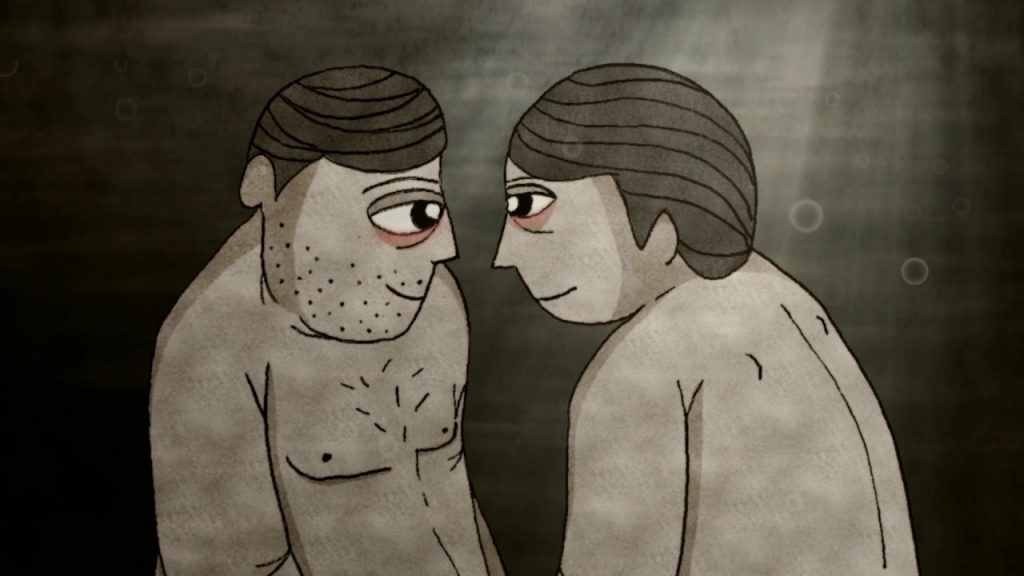
Directed by Abhishek Verma, this short brings food and ‘coming out’ together in a curiously delicate but simple recipe. 28-year-old Amit plans on cooking his father’s favorite fish curry on the occasion of announcing his queer identity to his parents. The entire 12-minute short builds up to it, and the final act is impactful because of the buildup that has gone into it.
It is the details that promise to fascinate the audience in this hand-drawn animation. The two-dimensional animation in joyless watercolors makes it look like a memory from the past, lending to it a certain neutral gravity in time. Lalit’s apartment, where he lives with Ashutosh, is a safe space for the budding of their queer love. However, when Lalit’s father looks around, it feels like an outsider’s gaze intruding on the privacy of the lovers. The traditional fish curry, or maacher jhol, that is a part of the traditional East Indian diet, mainly in Odisha and West Bengal becomes an important character in the film. Verma’s work is a subtle node to queer love. Maacher Jhol, or The Fish Curry, won the Best Indian Narrative Short Film Award at the Kashish Film Festival.
10. The Song We Sang (2020)
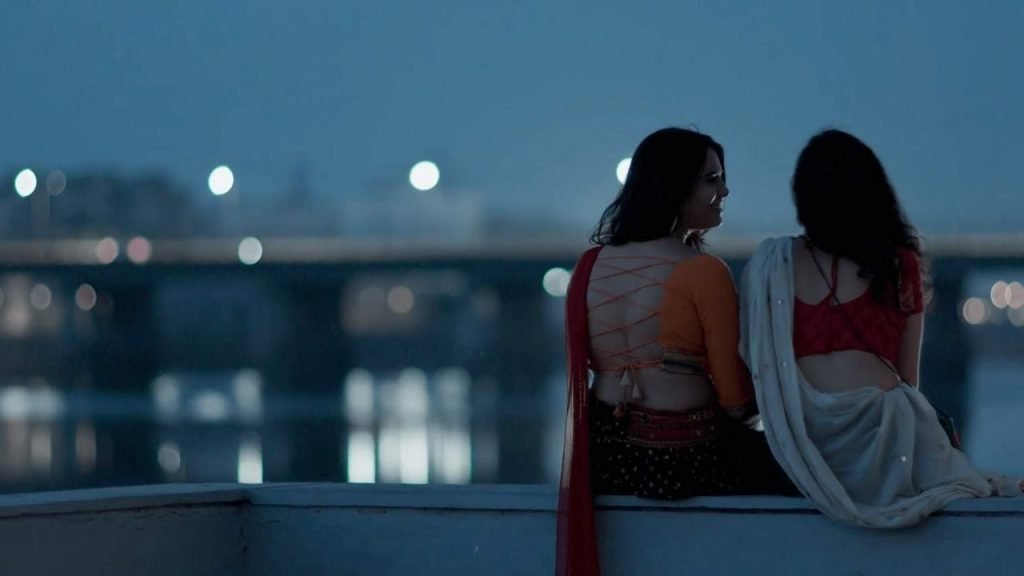
Romances, where two people fall for each other over the course of long walks on a single night, have been the foundation for the romantic notion about cities in so many young people of this generation. This 21-minute short by Aarti Neharsh is a small but important contribution to the same genre. Krishna (played by Serena Walia) and Alia (played by Ayushi Gupta) meet on one of the nights of the Navratri festival in the city of Ahmedabad. As the night progresses, they take to the streets – walking around, eating paani puri, browsing through clothes, and resting beside each other – as they converse about their lives.
This is a film that doesn’t draw our attention to the individual sexualities of the protagonists on the screen, even when an exchange of physical intimacy transpires between them. It is about the mutual bond that they develop over this single night, nameless and queer in its existence. Krishna and Alia have contrasting personalities and professions, much like the heteronormative romances, we find in popular films. That way, this film helps to subvert how we generally perceive queer interaction – closeted, bonding over trauma, and aching for approval. Neharsh also intended to create a visual space for complete unapologetic liberation for women on screen, and I believe she is very successful in doing the same here. It premiered at the Kashish Mumbai International Queer Film Festival in 2020.
11. Amar, Prem (2018)
Separation dramas between heterosexual couples also form a major part of the romantic imagination in popular culture. Directed by Mujeer Pasha, this 12-minute short is a subversion of the said hetero-norm. Did you notice how the title itself is a play upon the name of a classical Bollywood romance featuring Sharmila Tagore and Rajesh Khanna?
Here, we see two young men, Amar (played by Veeresh) and Prem (played by Vijay Ashok Sharma), in a fleeting relationship. One moment, they are cuddling in front of the television to watch a documentary; at another moment, they are preparing to part ways. The simplicity of this short film is so humbling to watch that it instantly brings a smile to the face. The lack of extraordinariness remains with you long after you have watched this one. Like any other relationship, Amar and Prem stumble through the terrains of happiness, intimacy, boredom, and loneliness in the process. Don’t miss out on the Wong Kar Wai-inspired dance sequence in the final minutes, albeit Bollywood-ised.
12. A Monsoon Date (2018)

Directed by Tanuja Chandra, this short is about an anonymous transwoman on her way to meet her date, where she plans to confess her identity. The backdrop of this date is a torrentially rainy day in Mumbai. Instead of kindling any romantic associations along the way to this date, the protagonist (played by Konkona Sen Sharma) seems to be tormented by it, mentally and physically. The film is also a nod to the cab-sharing culture that has become extinct since the Covid-19 pandemic set in.
Related to Queer Movies: 15 Best Konkona Sensharma Performances
The camera fixes itself on Konkona’s expressions which are constantly swaying between hope and anguish. She delivers a performance so strong that I’d urge you to spend 20 odd minutes just to appreciate this auteur’s prowess. Her experiences along the way to this coffee shop form a hasty but palpable premise to the plot. The rain forms potent imagery in the film too. Its constant pouring nature has an embracing aspect about it, clinging to the skin and making one feel the need to feel and accept one’s body for what it is. The screenplay can come off as slightly patchy, but it still manages to hold up the unbearably scathing tension that comes with the decision of ‘coming out’ to one’s partner.
13. Devi: Goddess (2017)
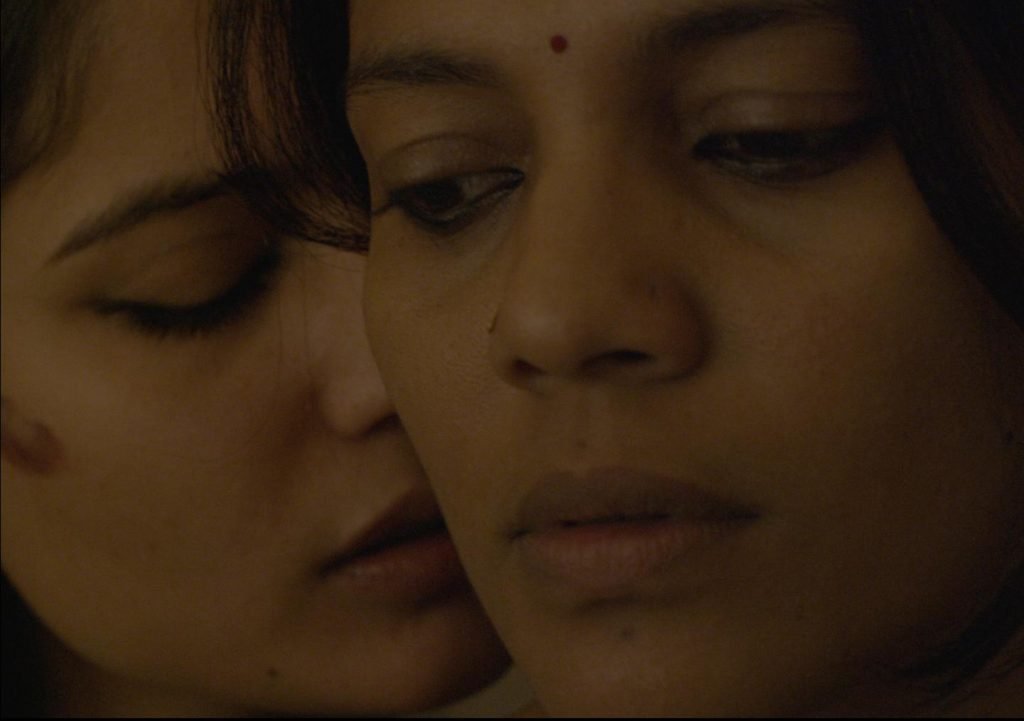
Written and directed by Karishma Dube, this film instantly reminded me of The Sensualist by Ruskin Bond. Tara (played by Aditi Vasudev) is attracted to her childhood maid, Devi (played by Priyanka Bose), but their secret tryst accidentally spills out during a party.
This is a story of ‘coming out’, forcing us to look at the many layers of politics – class and economy – that go into crafting an identity, even a queer one. For a more prominent understanding of the same, this is an all-female world that we are introduced to. The sexual tension between Tara and Devi against a sultry, barely-lit, golden-hued setting emanates affectionate warmth, kudos to Dube’s direction. This 13-minute short brings to the forefront an ironical intersectional commentary on the ideas of ‘modern’ and ‘progressive’ in an Indian family that is clearly outside the frame of a typical hetero-patriarchal family but rooted in its belief systems.
14. The Sixth Element (2016)
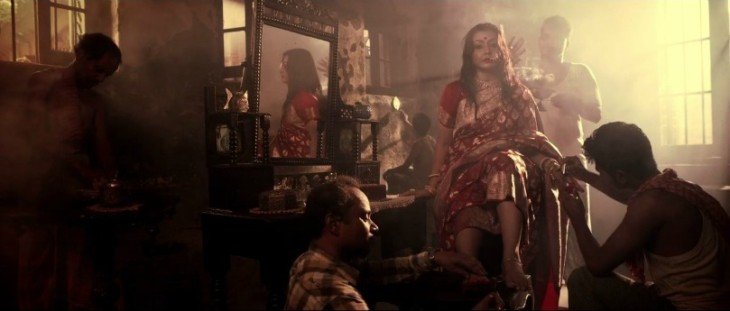
Directed by Arjun Dutta, this short follows the story of Mrinalini Devi (played by Debjani Chatterjee), who has been forced into separation from her true love at a young age and into a marriage. As a widow now, she lives in an ancestral mansion. It almost reminds one of Kiran Kher’s character from Bariwaali (2000). She comes in association with Catherine (played by Verity Danbold), the head of the NGO, to which she plans to sell the house. What follows is a story of companionship that soon transgresses the moral boundaries of an orthodox society and, through it all, a pathway to feeling liberated in love.
I don’t think that I am the least bit astonished that this film came out of Bengal. It ropes in the trope of the quintessentially modern Bengali women figure – a widow – which has been explored by Tagore and Rituparna Ghosh in their own popularly distinct ways in Bengali literature and cinema. However, this 40-minute short helps subvert the heteronormative gaze around her. Chaterjee superbly etches out the aching for love and subsequent guilt of the intimacy she now shares with Catherine. On the other hand, Danbold’s character fails to surpass the cliched tropes of the western world. Thankfully, the background score and the setting can make up for it.
15. Let Love Be (2019)
Every year, more and more Pride Marches are being held in cities and urban towns across India to help foster visibility of the queer community and put forward their rights. After these grand celebratory marches end, the crowd disperses, and the folx set out on their way back home, can they afford to wear their sexuality like a badge of honor in public? Directed by Jomin Verghese, this has to be the shortest film on this list – almost 3-minutes-long – and the most unique recommendation.
With a simple narration, this film seeks to talk about the uncomfortable gaze of heteronormativity that falls upon these folx, making them feel awkward and bullied in public. While it doesn’t spend enough time to explore this idea dedicatedly, it puts forth a queer person attempting to remove the markers of queerness from his attire in order to become one with the masses – it is powerful imagery. Although the makers wanted to highlight a particular message about independence through this short, it doesn’t fall short of generating a conversation around queer visualization.




